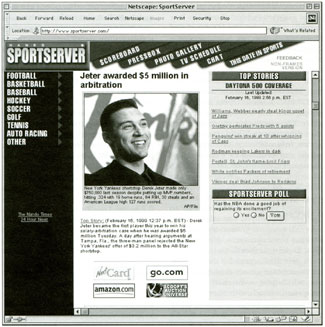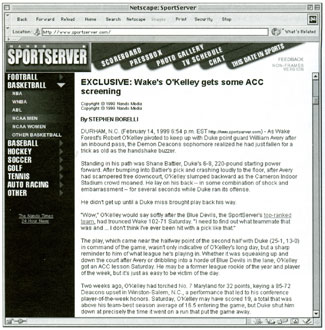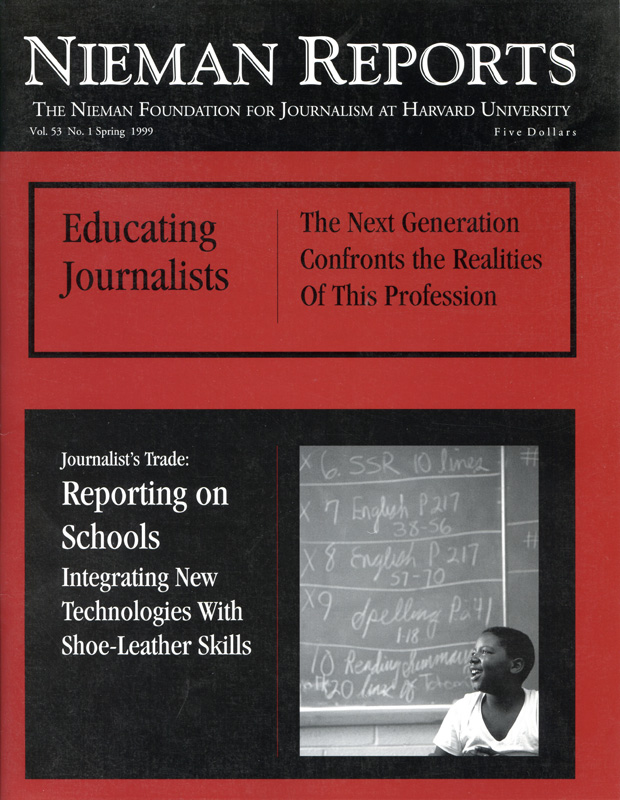
I knocked on the coach’s office door in the visitor’s clubhouse at Durham Bulls Athletic Park.
“Come in,” said Stump Merrill, the gruff manager of the Columbus (Ohio) Clippers, the top minor-league team in the New York Yankees’ system. I opened the door, and the bald, pot-bellied man peered up from his lineup card.
“Hi coach,” I began. “My named is Steve Borelli. I’m with an on-line sports news service called Nando Media.”
Merrill squinted and his mouth opened slightly. “I’m doing a piece on one of your players, Mike Lowell. I was wondering if you had a minute.”
He shook his head, saying it was too soon before game time.
A Columbus Clippers beat reporter was surprised when I told him about this in the press box. He said Merrill is usually accommodating to all members of the media, even ones he doesn’t know, and even one hour before game time—out of fear that any snuffs and snarls might get back to Yankees owner George Steinbrenner. But Nando Media? It was nobody significant.
Such is the plight of so-called “new media,” or Internet journalists. While in the minds of many we are what the future will be, we’re still stuck in the realities of the present.
As a 24-year-old climbing the journalism ladder, I’ve found my nine and a half months as an editor and reporter for Nando’s SportServer at times rewarding, at other times aggravating. Whether it has been in dealing with grizzled sports veterans like Merrill or long-standing sports organizations like the Atlantic Coast Conference (ACC), we have had a difficult time getting access and respect that matches that of more traditional news media outlets. Without those ingredients, it can be a lot tougher to do our job well.
The SportServer is the main sports artery of Nando Media, the new media hub of the McClatchy newspaper chain. The SportServer provides round-the-clock sports news and statistics and is sprinkled with feature stories and photos. We are like any sports page except that our immediate posting of news allows readers to open their front door and pick up a fresh paper with nearly every click of their computer’s mouse. Stories and information, either acquired from major news services or produced by one of the six members on the SportServer’s editorial staff, are added and updated constantly throughout the day and night.
The mission at the SportServer is to get news up on our site first and fast, then cover it more completely and accurately than anybody else. During my office shifts (which I do four days each week), I will post an Associated Press story detailing how the Denver Broncos won the Super Bowl, hopefully before CNN/Sports Illustrated or ESPN.com does. I also want readers to have other reasons to read the SportServer than just to see a write-up on the big game. Maybe someone wondered how many career touchdown passes Broncos quarterback John Elway had in his Super Bowl career and goes to our special site devoted to the Super Bowl to find out. Or maybe the game involving their favorite team in the opening round of the NCAA men’s basketball tournament isn’t televised in their area, so they go to our special March Madness site to check out our in-game scoreboard.
My work in the office involves much moving of information from various sources onto our Web site. One time it meant quickly getting a picture up on our site of Mark O’Meara sinking the putt that clinched the Masters. Or with the death of former Kansas City Royals pitcher Dan Quisenberry last fall we rushed to post his career statistics. Sometimes work like this—the mechanical shuffling of information—makes me feel as though the reporting and editing skills that trained me for a job in journalism are being woefully neglected.
At the print publications where I worked leading up to this job—Baseball America magazine, The Washington Post, The (Memphis) Commercial Appeal, the Pensacola (Fla.) News Journal—often I could spend more time crafting a story, or even a headline, than I can now. On an average of one to two days a week at Nando, I’m given more time to develop stories and I write features and columns both in and outside the office to enhance our site’s overall coverage. The reporting I do outside the office allows me to feel like I am employing the skills of a traditional journalist. I satisfy my desire to write and find opportunities to maintain a visible presence in the sports world, something my experience with the Clippers’ manager reminded me is important.
Coming to Nando was, I think, a good career move for me at this stage in my professional growth. For one reason, we cover major league sports for a national—in fact, an international—audience. Because of our audience, we don’t mess much with local interest stories, such as those involving high school and small college sports that I did often at my previous jobs. At Nando, I have had the opportunity to dive into coverage of major-league baseball, major college basketball, the NFL and professional tennis.
But there can be a downside, too, because there are times when we aren’t yet regarded as a legitimate news gathering operation. When I introduced myself to major-league pitcher Jimmy Key in the Baltimore Orioles’ clubhouse last season, he repeated the name of my employer—“Nand-oh Media”—like I worked for some Romper Room operation. When I was interviewing University of California baseball coach Bob Milano over the phone, I got a “Where are you from again?” after I’d asked only a few of the questions I’d prepared for him. When I asked a member of the University of North Carolina’s media relations department why we weren’t given a reserved spot for our photographers on the floor during their men’s basketball games, he said, “We don’t give everybody a spot, and the N&O already has two.” (The N&O is Raleigh’s News & Observer, Nando’s sister publication next door. Even if it’s a regional newspaper, people in this area who have heard of Nando immediately think we are part of that publication because our title derives from its name. We aren’t.)
In the pecking order of access, Nando usually falls behind print media, broadcast media and even some new media outlets whose names contain within them the names of established national print or broadcast organizations. (For example, the Super Bowl people told us they just didn’t have the space to accommodate us, although our competitors CNN/SI and ESPN.com, whose Web sites are similar to ours, were given media credentials.) New media outlets which don’t have this establishment backbone will surely assume a much more prominent role over time, but it will only happen as a generation of news and sports enthusiasts grows up reading the World Wide Web as much as their parents relied on the front page.
But for a person caught in this transition period, at times the wait can be tiresome. In five years of covering sports, I have noticed that individuals and sports teams often think about their dealings with the media as a way of garnering free publicity. Circulation and a media outlet’s reputation turn out to be directly proportional to the kind of access its reporters get to a manager or player. The more people who read about a team or its players, the more fan interest is generated and, ultimately, the more money the team makes, or so the logic of this arrangement goes.
Few in the sports world recognize the name Nando or appear to have any understanding about how our Web site—or on-line media in general—is able to connect with many of the people they want to reach. This can make it very hard for me to establish a connection with sources who have come to equate cooperation with the media with some kind of positive impact on their bottom line. By contrast, while working for the prominent print organization in several similar-sized markets, my calls were regularly returned and access seemed automatic.
But because Nando is on the Internet, and society seems to be split between the Internet-savvy and the Internet-free, our success at gaining access to an event or interview remains spotty. We managed to obtain a credential to cover last year’s U.S. Open tennis tournament, as the USTA. credentials coordinator follows coverage of the world of tennis on our Tennis Server.
Yet we’ve been denied credentials at the Super Bowl and the ACC’s basketball tournament. The ACC had failed to see us as objective journalists who could potentially bring them an additional audience. Rather I am convinced that they regarded us as competitors to their own Web site. While their Web site, like ours, consists of wire stories and statistics about teams and sports within their conference, they perform more like a college’s sports information department. While we are also a sports information source, we are a media organization as well, just like newspapers and broadcast entities that cover their games.
When we do gain access to events, I have noticed we are making some progress. North Carolina, Duke and North Carolina State each provided access for us to report on their home games this during season, which gave us the chance to make important inroads with “face” time. By late in the ACC’s regular season, Duke coach Mike Krzyzewski, North Carolina’s Bill Guthridge and many of their players recognized the Nando reporters and responded to—or evaded—their questions the same way they did with some of their beat reporters Sports information directors who have granted us credentials to cover their teams’ games are now taking a look at our Web site, and their reactions to our coverage have helped land us an ACC tournament credential for this spring’s event.
Our potential for gaining increased recognition is promising, but the wait is still frustrating. This was made very clear to me while I was covering the U.S. Open and noticed that a Sports Illustrated reporter was granted exclusive interviews with tennis players after they had finished their post-match press conferences. For now, I can only watch such access with a grimace. As our reputation for skillful journalism grows along with our faith in our young company, my hope is that in a few years our reporters will garner the kind of respect that members of the traditional media now enjoy.

Stephen Borelli is a sports content editor and baseball writer for the Nando Media SportServer (www.nandomedia.com) in Raleigh, North Carolina. Nando Media publishes The Nando Times (www.nandotimes.com) and the SportServer (www.sportserver.com).


